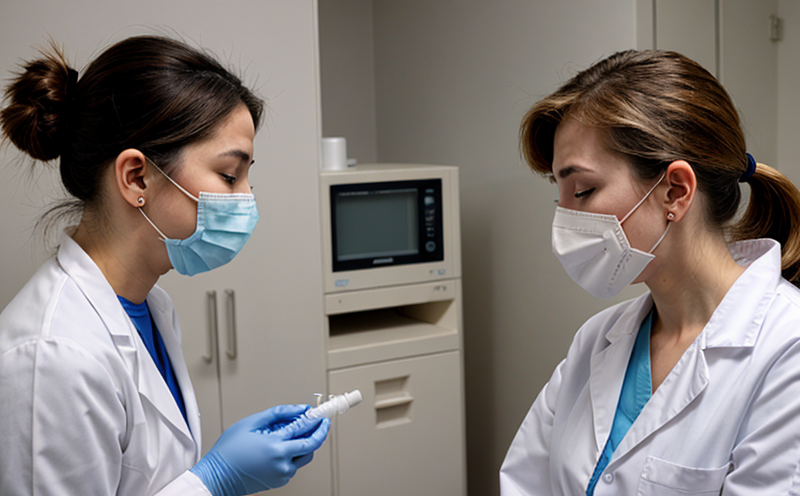Allergen Exposure Testing in Dairy Facilities
Understanding allergens and their presence in dairy facilities is crucial for ensuring food safety and quality. This service focuses on identifying potential allergens that could contaminate dairy products, which is especially important given the prevalence of milk and dairy products as sources of allergens such as casein, lactose, whey proteins, and other components derived from cows' milk.
Our testing process begins with a comprehensive evaluation of the facility’s layout and operational procedures to identify high-risk areas. From there, we collect samples using industry-standard methodologies, ensuring that the collected specimens accurately reflect potential contamination risks. Once collected, these samples are analyzed for the presence of specific allergens using advanced analytical techniques.
The testing process is meticulously detailed, involving several key steps:
- Sample Collection: Utilizing aseptic sampling protocols to avoid cross-contamination and ensuring that all samples are representative of the environment being tested.
- Analytical Methods: Employing validated tests such as ELISA (Enzyme-Linked Immunosorbent Assay) for rapid allergen detection, LC-MS/MS (Liquid Chromatography-Mass Spectrometry) for precise quantification, and other relevant technologies tailored to the specific allergens of concern.
- Results Interpretation: Providing detailed reports that include not only the presence or absence of allergens but also their concentration levels, which are critical for understanding potential risks.
This service is particularly beneficial for dairy facilities looking to meet stringent regulatory requirements and ensure product safety. By identifying potential allergen sources early in the process, facility managers can take proactive measures to mitigate risk, thereby protecting consumers from adverse reactions and maintaining brand integrity.
Our dedicated team of experts ensures that all testing adheres to international standards such as ISO 17025 for laboratory competence, ensuring reliability and accuracy. This service is not only a compliance measure but also a step towards enhancing consumer trust in the dairy products produced within these facilities.
Why It Matters
The significance of allergen exposure testing in dairy facilities cannot be overstated. The potential for cross-contamination between non-allergenic and potentially allergenic products can lead to severe health consequences, especially for individuals with known allergies. In the case of milk and dairy products, these risks are particularly acute due to the widespread consumption of such items.
Regulatory bodies around the world have implemented strict guidelines to address this issue, including the Food Safety Modernization Act (FSMA) in the United States and similar frameworks internationally. These regulations mandate that food facilities implement practices designed to prevent cross-contamination with allergens. This service helps dairy producers comply with these standards while also enhancing their reputation for quality.
From a broader perspective, ensuring allergen safety is part of a larger effort to promote public health and reduce the incidence of allergic reactions. By providing reliable data on allergen presence and levels, this testing service supports both regulatory compliance and consumer confidence in dairy products.
- Risk Mitigation: Early detection allows for targeted interventions that can prevent contamination from occurring.
- Consumer Trust: Reliable test results build trust with consumers who rely on allergen-free claims made by food producers.
- Regulatory Compliance: Adherence to regulatory standards is essential for maintaining a license to operate and avoid costly penalties.
The importance of this testing cannot be underestimated. It plays a vital role in safeguarding public health, ensuring compliance with legal requirements, and fostering consumer trust.
Benefits
- Potential Allergen Identification: Accurate identification of allergens present in the facility helps in proactive management strategies to prevent contamination.
- Compliance with Standards: Ensures adherence to international standards like ISO 17025, which is crucial for regulatory compliance and maintaining a license to operate.
- Consumer Confidence: Reliable test results enhance consumer trust in the safety of dairy products produced within the facility.
- Economic Advantage: Reduces the risk of recalls and legal actions, thereby protecting the brand’s reputation and reducing financial losses.
The benefits extend beyond immediate compliance; they contribute to a sustainable business model by fostering long-term relationships with consumers. By demonstrating a commitment to quality and safety, dairy facilities can build a loyal customer base that values transparency and reliability in their products.
Environmental and Sustainability Contributions
The environmental impact of allergen exposure testing is minimal due to the controlled nature of our laboratory environment. However, by ensuring compliance with allergen-free standards, this service indirectly contributes positively to the environment through reduced waste from recalls and improved resource efficiency.
One key aspect of sustainability in dairy facilities is the minimization of cross-contamination, which can lead to wasted resources if not managed properly. By identifying potential allergens early on, our testing service helps prevent such wastage, contributing to more efficient use of raw materials and energy.
- Efficient Resource Use: Preventing contamination ensures that fewer resources are used in the production process, leading to a reduction in waste and lower environmental impact.
- Reduced Waste: By identifying and addressing allergen risks early, facilities can avoid recalls and subsequent waste associated with product disposal.
- Energy Efficiency: With reduced contamination risks, there is less need for additional cleaning processes, leading to lower energy consumption in the facility.
The commitment to sustainability extends beyond immediate operational impacts. By ensuring allergen-free products, dairy facilities can contribute to a healthier global environment by reducing the incidence of allergic reactions and their associated healthcare costs.





